#open ocean mammals
Photo
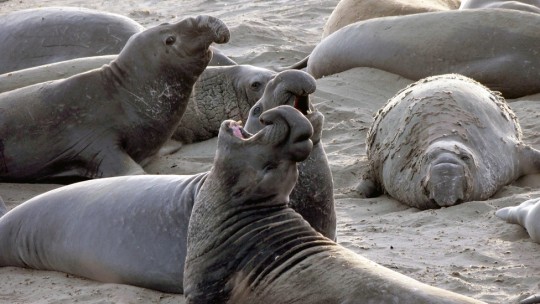

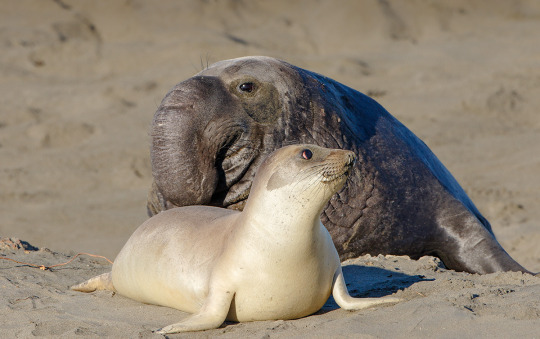
Elevating the Elephant Seal
Found all along the Pacific coast, from Alaska to Antarctica, elephant seals are famous for their size, aggression, and unusual noses. There are two species of elephant seal, both belonging to the true seal family Phocidae. The northern elephant seal (Mirounga angustirostris), as its name suggests, is dispersed along the northern coasts of North America, from the American state of Alaska all the way down to Baja California in Mexico. Southern elephant seals (Mirounga leonina) reside in Antarctic and sub-Antarctic waters up to the southern most regions of Chile and Argentina in South America. Both species migrate twice a year. The rest of the year is spent foraging in the deep waters of the Arctic or Antarctic, respectively, and these trips can take anywhere from 10,000km to 20,000, making them one of the longest migrations of any marine mammal.
The main difference between northern and southern elephant seals is their size. A male northern elephant can weigh between 1,500 and 2,300kg, while females are much smaller at 400 to 900 kg. M. angustirostris also has a shorter nose than its southern cousin. M. leonina females are similar in size to the northern elephant seals, at 400 to 900 kg, but males can easily reach up to 4,000kg, making them the largest species of seal on the planet. Both elephant seal species are generally brown in color and have only a short, bristly coat of hair. They have no ears, distinguishing them from other pinnipids like sea lions. The males, or bulls, of both species also have pronounced nose called a proboscis which serves to amplify loud mating or threatening calls.
Elephant seals come ashore twice a year in groups called colonies. In the summer, individuals gather on land to go through a ‘catestrophic molt’. During this time, the fur and the top layer of skin peel from the body. This is a necessary process because when at sea, blood is not circulated to the skin in order to keep elephant seals warm. Because of this, they are also unable to grow new hair or skin continuously. When the outer layers of skin and hair wear down or become ragged, individuals travel to traditional breeding grounds and take a month to shed their outer layers and grow a new protective coat.
From December to March, dominant males congregate at breeding grounds to compete for mating rights. The bulls are very aggressive, and fight by slamming their bodies together and raking each other with their sharp canines. Once a bull has established dominance on a beach, other males typically leave, though some may try to sneak back in to mate when the alpha bull isn’t looking. Each dominant male controls a harem of 40 to 50 females. Each female, or cow, only gives birth to one or two pups after a gestation period of 10 to 12 months. Only a few days after giving birth, she is ready to mate again.
In the meantime, the mother nurses her pup almost constantly for about a month. During this time, the female does not leave the beach to search for food, and both she and the bulls lose up to a third of their body weight. After about a month the mother weans her pup off her milk. However, some pups are “super weaners” and will search out another female-- usually one who has lost her pup-- and nurse from her for as long as possible. This gives the pup a significant size advantage: pups that are successfully weaned at 6 weeks weigh only 160kg, while super weaners can weigh up to 270 kg. The advantage of being this big is in the blubber: elephant seals require large amounts of excess fat as an energy source when food is scarce and to keep them warm when they forage in the cold waters of the northern or southern Pacific Ocean. However, the effectiveness of this strategy for survival has yet to be fully determined. The average lifespan of M. angustirostris is 9 years, while M. leonina can live up to 21 years old, though in both species males tend to die much sooner than females.
Outside the molting and mating seasons, elephant seals spend up to 90% of their lives in the water, usually alone. Foraging migrations require long, deep dives into the cold Arctic or Antarctic oceans to search for squid, rays, small sharks, and schooling fish. Some of these dives are the deepest recorded for any non-cetacean mammal at up to 1,550m below the surface. To reach these depths, elephant seals can hold their breath for almost two hours, although the average length of a dive is 20-60 minutes. Due to their large size, adult elephant seals have few predators. Some sharks, like great white sharks (Carcharodon carcharias) and southern sleeper sharks (Somniosus antarcticus) will go after adults when desperate. More common is predation on elephant seal pups; killer whales (Orcinus orca), leopard seals (Hydrurga leptonyx), and New Zealand sea lions (Phocarctos hookeri) will all hunt young pups when no parents are nearby to defend them.
Conservation status: The IUCN has rated both elephant seal species as Least Concern. In the late 1800s, northern elephant seals were thought to be hunted to extinction but a population of 20-100 individuals was discovered on Guadalupe Island off Baja California. Southern elephant seals were also hunted, but to a lesser extent. M. angustirostris and M. leonina populations are now well in the hundreds of thousands, though the population of southern elephant seals is declining once more due to disruption of their primary food sources.
Photos
Taiki Adachi
Nick Ut
Steve Zamek
If you like what I do, consider buying me a ko-fi!
#northern elephant seal#southern elephant seal#carnivora#phocidae#elephant seals#seals#pinnipeds#carnivores#mammals#coasts#coastal mammals#open ocean#open ocean mammals#pelagic fauna#pelagic mammals#north america#western north america#south america#western south america#antarctica#pacific ocean
79 notes
·
View notes
Note
Do you do marine mammals as well? I would like to know your chunk funk gunk rating of my beloved Orcinus orca
Today on CHUNK! FUNK! GUNK! We rate
the ORCA WHALE:
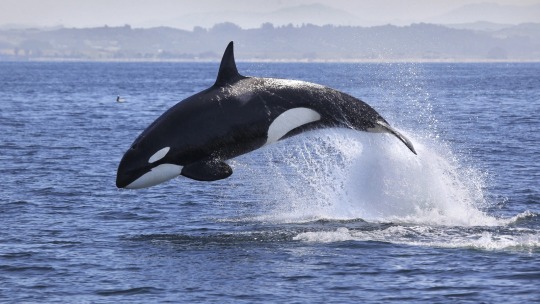
9.3/10 Chunk
10/10 Funk
1/10 Gunk
Orcas! They’re so cool- though they aren’t actually whales. Orcas are dolphins, but they’re so big that they’re referred to as whales.
Their chunk is incredible, but only dampened by the fact that they do indeed have bones. High chunk. Orcas are iconic, look at that bold black and white patterning; Their beautiful smiles; and their incredible brains… maximum funk. From my brief research, it seems that Orcas do secrete mucous, but it’s the normal way mammals do (eyes, internal organs, etc.) so they get low gunk.
Overall Rating: 9.7/10
I’ve never had too much of an interest in orcas (it was mostly from my “not like other girls” mentality holding me back from enjoying popular things) but they’re REALLY cool. They’re so incredibly smart and their hunting patterns are amazing.
My favorite orca related fact is that the biggest predators (physically, not numerically) for the North American Moose are orca whales!!
#chunk funk gunk#chunk#gunk#funk#asks open#orca whale#orca#killer whale#orcas#ocean animals#ocean#marine mammals#ocean mammals#dolphins#whales#dolphin#whale
196 notes
·
View notes
Text
One thing that pisses me off is people seeing fish in aquariums (the establishments, not home aquariums) and being like “It’s so sad because the ocean is so big and the tank is so small and they’ll never know freedom blah blah blah-“ I’m not talking about sharks and marine mammals here but the majority of fish are not at all bothered by being in an aquarium instead of the open ocean. Like, I personally would love to be a little clown fish in one of those big reef tanks. Fed regularly. Whole team of people monitoring my health and well-being. No predators. Medicated if I show signs of illness. Aquarium fish have cushy gigs in comparison to their wild companions.
27K notes
·
View notes
Text
Okay, I know people as a general rule tend to not care about invertebrates as much as cute, fuzzy mammals, but this is a must-read if you care about animal welfare. The short version is that horseshoe crab blood has been used for decades in medicine as a way to test whether something is truly sterile; the blood clots in the presence of bacteria. Since then millions of horseshoe crabs have been captured and drained of blood, even though a synthetic alternative was developed a few years ago.
They go through a pretty brutal experience in the process. They're caught by fishermen who often throw them by their tails into a pile in the open air, and they're then trucked to a bleeding facility where they're strapped down and their blood is removed with needles jabbed directly into their hearts. Over half their blood may be taken, after which they're supposed to be returned to the ocean. However, it's likely many of them never make it back, instead turned into fish bait and sold by the same fishermen who caught them in the first place.
Apart from the fact that this is a horrific thing to put any animal through, the attrition due to fatalities has put a serious dent in horseshoe crab numbers. This is compounded by massive habitat loss, pollution, and the capture of horseshoe crabs as food, particularly as the females of one species are considered a delicacy. And other animals that rely on horseshoe crabs are suffering, too. The American rufa subspecies of the red knot, a medium-sized shorebird, is critically endangered as the horseshoe crab eggs it must have in order to successfully complete migration have become increasingly scarce, and it is likely the bird will become extinct if trends continue.
While there are guidelines for medical horseshoe crab harvest, they're considered optional. The few laws that exist are poorly enforced. Short of a complete ban on horseshoe crab blood in favor of the synthetic alternative, these animals are in very real danger of going extinct after a history spanning over 400 million years on this planet.
Thankfully, this article is not the first to bring forth the issues surrounding horseshoe crab harvest. Here are a few resources for further information and action (US based, though horseshoe crabs are threatened throughout their entire range):
Horseshoe Crab Conservation Network - https://horseshoecrab.org/conservation/
Wetlands Institute - https://wetlandsinstitute.org/conservation/horseshoe-crab-conservation/
Horseshoe Crab Recovery Coalition - https://hscrabrecovery.org/
#animal welfare#animal cruelty#cw animal cruelty#animal suffering#horseshoe crabs#invertebrates#wildlife#animals#environment#conservation#endangered species#extinction#nature#medicine#science#scicomm#science communication
8K notes
·
View notes
Text
"Many people know about the Yellowstone wolf miracle. After wolves were reintroduced to the national park in the mid-1990s, streamside bushes that had been grazed to stubble by out-of-control elk populations started bouncing back. Streambank erosion decreased. Creatures such as songbirds that favor greenery along creeks returned. Nearby aspens flourished.
While there is debate about how much of this stemmed from the wolves shrinking the elk population and how much was a subtle shift in elk behavior, the overall change was dramatic. People were captivated by the idea that a single charismatic predator’s return could ripple through an entire ecosystem. The result was trumpeted in publications such as National Geographic.
But have you heard about the sea otters and the salt marshes? Probably not.
It turns out these sleek coastal mammals, hunted nearly to extinction for their plush pelts, can play a wolf-like role in rapidly disappearing salt marshes, according to new research. The findings highlight the transformative power of a top predator, and the potential ecosystem benefits from their return.
“It begs the question: In how many other ecosystems worldwide could the reintroduction of a former top predator yield similar benefits?” said Brian Silliman, a Duke University ecologist involved in the research.
The work focused on Elk Slough, a tidal estuary at the edge of California’s Monterey Bay. The salt marsh lining the slough’s banks has been shrinking for decades. Between 1956 and 2003, the area lost 50% of its salt marshes.
Such tidal marshes are critical to keeping shorelines from eroding into the sea, and they are in decline around the world. The damage is often blamed on a combination of human’s altering coastal water flows, rising seas and nutrient pollution that weakens the roots of marsh plants.
But in Elk Slough, a return of sea otters hinted that their earlier disappearance might have been a factor as well. As many as 300,000 sea otters once swam in the coastal waters of western North America, from Baja California north to the Aleutian Islands. But a fur trade begun by Europeans in the 1700s nearly wiped out the animals, reducing their numbers to just a few thousand by the early 1900s. Southern sea otters, which lived on the California coast, were thought to be extinct until a handful were found in the early 1900s.
In the late 1900s, conservation organizations and government agencies embarked on an effort to revive the southern sea otters, which remain protected under the Endangered Species Act. In Monterey Bay, the Monterey Bay Aquarium selected Elk Slough as a prime place to release orphaned young sea otters taken in by the aquarium.
As the otter numbers grew, the dynamics within the salt marsh changed. Between 2008 and 2018, erosion of tidal creeks in the estuary fell by around 70% as otter numbers recovered from just 11 animals to nearly 120 following a population crash tied to an intense El Niño climate cycle.
While suggestive, those results are hardly bulletproof evidence of a link between otters and erosion. Nor does it explain how that might work.
To get a more detailed picture, the researchers visited 5 small tidal creeks feeding into the main slough. At each one, they enclosed some of the marsh with fencing to keep out otters, while other spots were left open. Over three years, they monitored the diverging fates of the different patches.
The results showed that otter presence made a dramatic difference in the condition of the marsh. They also helped illuminate why this was happening. It comes down to the otters’ appetite for small burrowing crabs that live in the marsh.
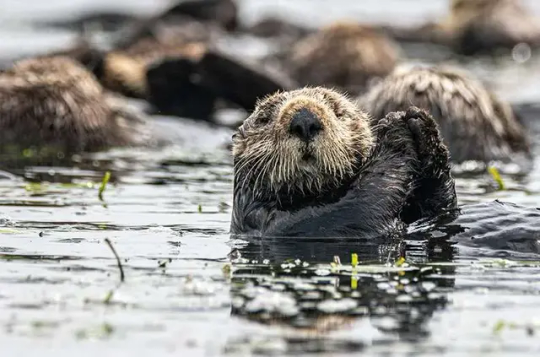
Adult otters need to eat around 25% of their body weight every day to endure the cold Pacific Ocean waters, the equivalent of 20 to 25 pounds. And crabs are one of their favorite meals. After three years, crab densities were 68% higher in fenced areas beyond the reach of otters. The number of crab burrows was also higher. At the same time, marsh grasses inside the fences fared worse, with 48% less mass of leaves and stems and 15% less root mass, a critical feature for capturing sediment that could otherwise wash away, the scientists reported in late January in Nature.
The results point to the crabs as a culprit in the decline of the marshes, as they excavate their holes and feed on the plant roots. It also shows the returning otters’ potential as a marsh savior, even in the face of rising sea levels and continued pollution. In tidal creeks with high numbers of otters, creek erosion was just 5 centimeters per year, 69% lower than in creeks with fewer otters and a far cry from earlier erosion of as much as 30 centimeters per year.
“The return of the sea otters didn’t reverse the losses, but it did slow them to a point that these systems could restabilize despite all the other pressures they are subject to,” said Brent Hughes, a biology professor at Sonoma State University and former postdoctoral researcher in Silliman’s Duke lab.
The findings raise the question of whether other coastal ecosystems might benefit from a return of top predators. The scientists note that a number of these places were once filled with such toothy creatures as bears, crocodiles, sharks, wolves, lions and dolphins. Sea otters are still largely absent along much of the West Coast.
As people wrestle to hold back the seas and revive their ailing coasts, a predator revival could offer relatively cheap and effective assistance. “It would cost millions of dollars for humans to rebuild these creek banks and restore these marshes,” Silliman said of Elk Slough. “The sea otters are stabilizing them for free in exchange for an all-you-can-eat crab feast.”"
-via Anthropocene Magazine, February 7, 2024
#otters#sea otters#conservation#erosion#coastal erosion#coastline#marshes#saltwater#marine science#marine biology#marine animals#sea creatures#ocean#sustainability#soil erosion#erosion control#crab#good news#hope
3K notes
·
View notes
Text
Sometimes, Chris Hayes' podcast goes off on these weird tangents, and the most recent episode is one of them, quite explicitly. It's about the history of Polynesia, which is always a fascinating subject--the Polynesian expansion, and really the whole history of the Austronesian-speaking peoples, seems like one of those feats with rare equal in human history. It's one thing to roam over the vast steppes of Asia--it's quite another to take a canoe, stick some outriggers on it so it doesn't tip over, and start faring the open ocean.
One point his guest makes that I found interesting is that for the most part the atolls and little islands of the Pacific are a very harsh environment. Big volcanic archipelagoes like Hawaii and Aotearoa/New Zealand are rare. Atolls and other reef islands especially are functionally big limestone slabs, often without any source of fresh water, with no large mammals, and with few native plants you can eat. The weather is nice, sure (when there isn't a typhoon--and I can't help but think a typhoon on a little island must be terrifying indeed), but these are not inherently resource-rich places. That the Polynesian (and Micronesian and Melanesian!) peoples not only could travel those distances, but make permanent habitation on the islands they came across, is kind of crazy! You have to be really prepared, with a package of supplies and technologies that set you up for success. Long-distance trade is possible, but you're not gonna be running any kind of substantial import economy across hundreds or thousands of miles of ocean via catamarans.
The comparison that springs to mind to me isn't a historical one like the European age of exploration, which was overwhelmingly to places already peopled and productive, but to science fiction scenarios of space exploration. You'd have to have a little bit of the wild-eyed zealot to be the sort of person who ignores the cries of "there is no possible useful return on this investment" to settle most of these places. But they did! And they thrived for centuries!
2K notes
·
View notes
Text
I love the idea of Percy becoming a marine veterinarian. Not because it would be easy, but because it wouldn’t be easy.
It would sound great and all, until he gets to vet school. And day 1 all he can think is “what the hell was I thinking?” This is all science. And most of vet school is about mammals, especially dogs, and he has to take specialty programs on the side for sea animals. He likes dogs and cats, and it is interesting, but that’s not why he’s here. Annabeth tells him to just learn as much as he can. So he does his best. He gets tutoring on the side. He makes good friends, and that helps a lot, but everyone there seems so much smarter than him. But annabeth and his friends help him study. He tries and he tries and he tries. He loves the marine animal programs he does. He thinks it’s so cool learning how sea animals function, and how the ocean/environment affects them. But the standard veterinary school course material is difficult for him to stay focused on. His grades aren’t the best, but he gets through it.
And after 3 years, he gets handed a white coat and stethoscope. And he feels like an imposter. He’s not a doctor! He’s not a healer like children of apollo. He’s not a genius like children of athena. He’s percy. This feels wrong. It feels good, and he’s proud of himself, but it also feels wrong.
Then his first day of residency, at a marine animal clinic, he is walking through his little orientation with the fellow residents and the attending vets. The first room they bring him into has a large water tub with a sea turtle in it. It’s not moving. It looks so sick and miserable. The head vet says that they’ve had this turtle for several months and just can’t figure out what’s wrong. She won’t eat, she won’t interact with other animals, she barely opens her eyes. They have decided to put her out of her misery, and tomorrow she will be euthanized. Percy steps away from the group and asks to approach her. He goes up to her, bends down, and put his hand on her shell. He telepathically asks what’s wrong, and she responds “My head. My head hurts so bad all the time. Ever since having my babies. It hurts to swim. It hurts to be in the light. I feel sick always. Please make the pain go away.” And Percy stands up and starts asking the attending vets questions about her history and her treatments. At first he panics because he doesn’t know what to do. But then he realizes… he does know what to do. He leaned this! So he suggests a treatment. Most of the vets in the room laugh or give him a doubtful look, but he begs them to try it anyway. So they do it, and within half an hour, this sweet sea turtle is happily swimming around the tub. She’s popping her head up to say hi. She’s even eating.
The other vets tried for months. No tests showed what was wrong. But Perseus Jackson walked in, spent two minutes staring at her, and cured her. Because he has powers that no one else has. The other vets only know how to read and observe signs, but Percy can listen to their symptoms.
And after that, every second of learning about animal anatomy and physiology was worth it. Because HE just got to save a sea turtle’s life. HIM!!
And that is why Percy Jackson very quickly becomes one of the best marine veterinarians in the field.
#screw all his teachers who said he was a lost cause#screw everyone who ever called him dumb#screw all the schools he got kicked out of#because percy jackson is the best marine vet the world has ever seen#percy jackson#percy’s career#pjo#heroes of olympus#pjo headcanon#percy jackson and the olympians#annabeth chase#marine vet percy
600 notes
·
View notes
Text
I recently found out a show I liked is 10 years old now so to not be the oldest thing on this blog I'm talking coelacanths for Wet Beast Wednesday. Coelacanths are rare fish famed for being living fossils. While that term is highly misleading, it is true that coelacanths are among the only remaining lobe-fined fish and were thought to have gone extinct millions of years ago before being rediscovered in modern times.
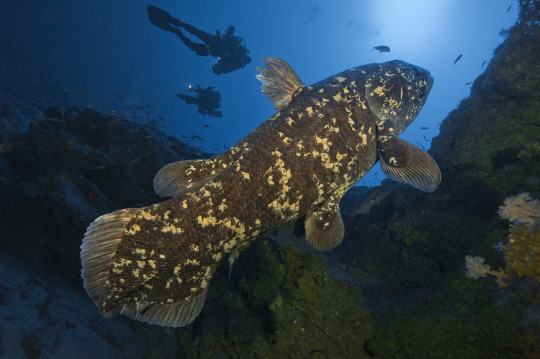
(image id: a wild coelacanth. It is a large, mostly grey fish with splotches of yellowish scales. Its fins are attached to fleshy lobes. It is seen from the side, facing the top right corner of the picture)
Coelacanth fossils had been known since the 1800s and they were believed to have gone extinct in the late Cretaceous period. That was until December 1938, when a museum curator named Marjorie Courtenay-Latimer was informed of an unusual specimen that had been pulled in by local fishermen. After being unable to identify the fish, she contacted a friend, ichthyologist J. L. B. Smith, who told her to preserve the specimen until he could examine it. Upon examining it early next year, he realized it was indeed a coelacanth, confirming that they had survived, undetected, for 66 million years. Note that fishermen living in coelacanth territory were already aware of the fish before they were formally described by science. Coelacanths are among the most famous examples of a lazarus taxon. This term, in the context of ecology and conservation, means a species or population that is believed to have gone extinct but is later discovered to still be alive. While coelacanths are among the oldest living lazarus taxa, they aren't the oldest. They are beaten out by a genus of fly (100 million years old) and a type of mollusk (over 300 million years old).

(image: a coelacanth fossil. It is a dark brown imprint of a coelacanth on white rock. Its skeleton is visible in the imprint)
Coelacanths are one of only two surviving groups of lobe-finned fish along with the lungfishes. Lobe-finned fish are bony fish notable for their fins being attached to muscular lobes. By contrast, ray-finned fish (AKA pretty much every fish you've ever heard of that isn't a shark) have their fins attached directly to the body. That may not sound like a big difference, but it actually is. The lobes of lobe-finned fish eventually evolved into the first vertebrate limbs. That makes lobe-finned fish the ancestors of all reptiles, amphibians, and mammals, including you. In fact, you are more closely related to a coelacanth than a coelacanth is to a tuna. Coelacanths were thought to be the closest living link to tetrapods, but genetic testing has shown that lungfish are actually closer to the ancestor of tetrapods.
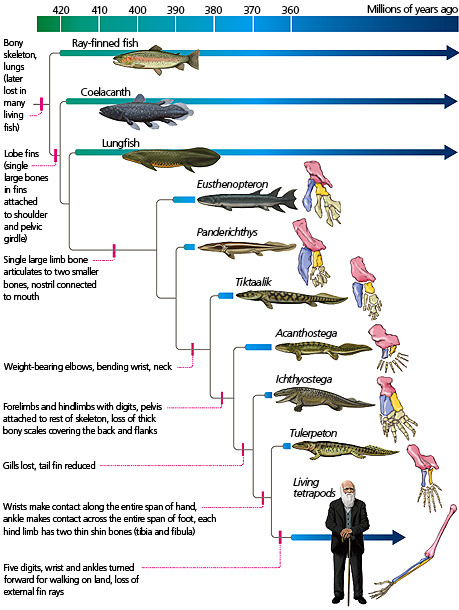
(image id: a scientific diagram depicting the taxonomic relationships of early lobe-finned fish showing their evolution to proto-tetrapods like Tiktaalik and Ichthyostega, to true tetrapods. Source)
There are two known living coelacanth species: the west Indian ocean coelacanth (Latimeria chalumnae) and the Indonesian coelacanth (L. menadoensis). Both are very large fish, capable of exceeding 2 m (6.6 ft) in length and 90 kg (200 lbs). Their wikipedia page describes them as "plump", which seems a little judgmental to me. Their tails are unique, consisting of two lobes above and below the end of the tail, which has its own fin. Their scales are very hard and thick, acting like armor. The mouth is small, but a hinge in its skull, not found in any other animal, allows the mouth to open extremely wide for its size. In addition, they lack a maxilla (upper jawbone), instead using specialized tissue in its place. They lack backbones, instead having an oil-filled notochord that serve the same function. The presence of a notochord is the key characteristic of being a chordate, but most vertebrates only have one in embryo, after which it is replaced by a backbone. Instead of a swim bladder, coelacanths have a vestigial lung filled with fatty tissue that serves the same purpose. In addition to the lung, another fatty organ also helps control buoyancy. The fatty organ is large enough that it forced the kidneys to move backwards and fuse into one organ. Coelacanths have tiny brains. Only about 15% of the skull cavity is filled by the brain, the rest is filled with fat.
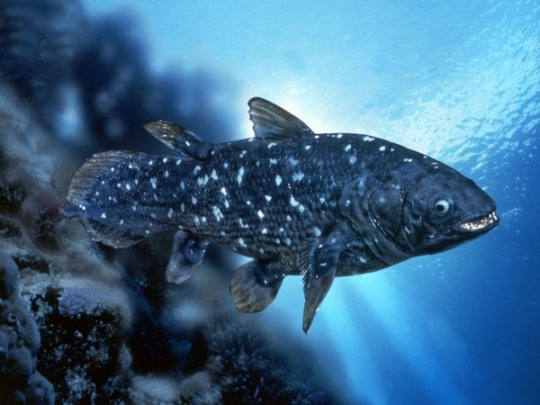
(image id: a coalacanth. It is similar to the one on the above image, but this one is blue in color and the head is seen more clearly, showing an open mouth and large eye)
One of the reasons it took so long for coelacanths to be rediscovered is their habitat. They prefer to live in deeper waters in the twilight zone, between 150 and 250 meters deep. They are also nocturnal and spend the day either in underwater caves or swimming down into deeper water. They typically stay in deeper water or caves during the day as colder water keeps their metabolism low and conserves energy. While they do not appear to be social animals, coelacanths are tolerant of each other's presence and the caves they stay in may be packed to the brim during the day. Coelacanths are all about conserving energy even when looking for food. They are drift feeders, moving slowly with the currents and eating whatever they come across. Their diet primarily consists of fish and squid. Not much is known about how they catch their prey, but they are capable of rapid bursts of speed that may be used to catch prey and is definitely used to escape predators. They are believed to be capable of electroreception, which is likely used to locate prey and avoid obstacles. Coelacanths swim differently than other fish. They use their lobe fins like limbs to stabilize their movements as they drift. This means that while coelacanths are slow, they are very maneuverable. Some have even been seen swimming upside-down or with their heads pointed down.
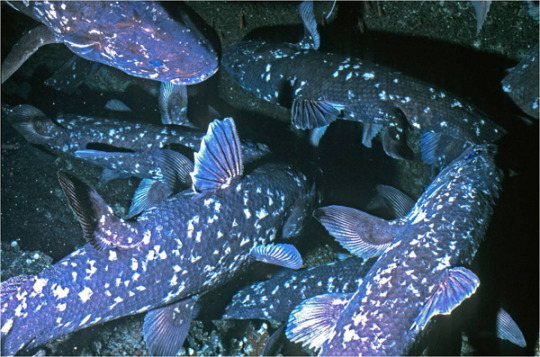
(image: an underwater cave wilt multiple coelacanths residing in it. 5 are clearly visible, with the fins of others showing from offscreen)
Coelacanths are a vary race example of bony fish that give live birth. They are ovoviviparous, meaning the egg is retained and hatches inside the mother. Gestation can take between 2 and 5 years (estimates differ) and multiple offspring are born at a time. It is possible that females may only mate with a single male at a time, though this is not confirmed. Coelacanths can live over 100 years and do not reach full maturity until age 55. This very slow reproduction and maturation rate likely contributes to the rarity of the fish.
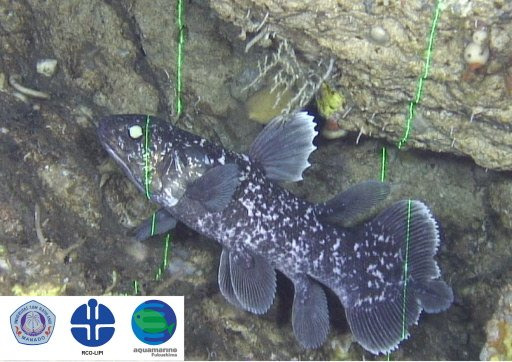
(image: a juvenile coelacanth. Its body shape is the same as those of adults, but with proportionately larger fins. There are green laser beams shining on it. These are used by submersibles to calculate the size of animals and objects)
Coelacanths are often described as living fossils. This term refers to species that are still similar to their ancient ancestors. The term is losing favor amongst biologists due to how misleading it can be. The term os often understood to mean that modern species are exactly the same as ancient ones. This is not the case. Living coelacanth are now known to be different than those who existed during the Cretaceous, let alone the older fossil species. Living fossils often live in very stable environments that result in low selective pressure, but they are still evolving, just slower.
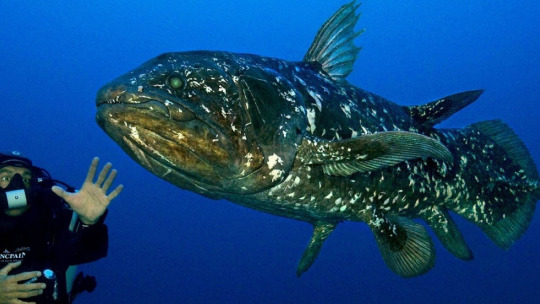
(image: a coelacanth swimming next to a SCUBA diver)
Because of the rarity of coelacanths, it's hard to figure out what conservation needs they have. The IUCN currently classifies the west Indian ocean coelacanth as critically endangered (with an estimated population of less than 500) and the Indonesian coelacanth as vulnerable. Their main threat is bycatch, when they are caught in nets intended for other species. They aren't fished commercially as their meat is very unappetizing, but getting caught in nets is still very dangerous and their slow reproduction and maturation means that it is long and difficult to replace population losses. There is an international organization, the Coelacanth Conservation Council, dedicated to coelacanth conservation and preservation.
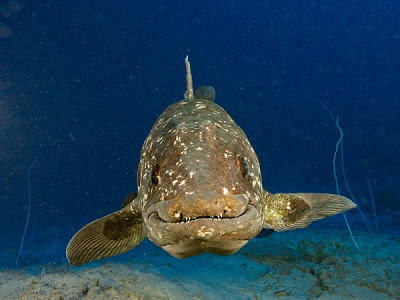
(image: a coelacanth facing the camera. The shape of its mouth makes it look as though it is smiling)
#wet beast wednesday#coelacanth#marine biology#biology#zoology#ecology#animal facts#fish#fishblr#old man fish#lobe-finned fish#sarcopterygii
1K notes
·
View notes
Text
Jessie's Girl
Hardersson x Child!Reader
Jessie Fleming x Child!Reader
Part of The Big Adventures Universe
Summary: The Natural History Museum
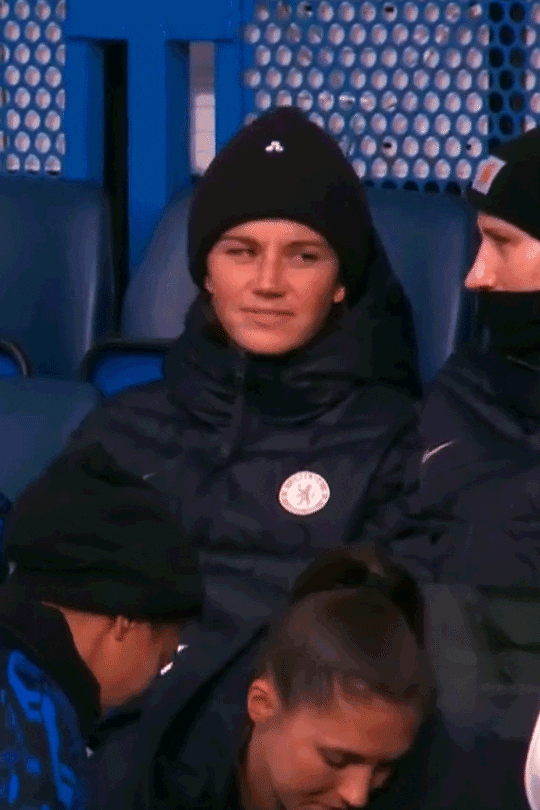
The day that Magda and Pernille need to go to some fancy dinner to represent the club, is the same day they take you to the Natural History Museum in London.
Jessie told you about how she went weeks ago and it's all you've been talking about since.
You manage to wear Magda and Pernille down with all your talking until they finally relent and book tickets. You insist on Jessie coming too and, soon enough, you're all crammed on the Tube on your way to the museum.
You're sitting in Jessie's arms, squished like a sardine amongst all the other people. You insisted to your Morsa about booking the tickets at opening time so you could see absolutely everything which is why the Tube is packed right now and Jessie's holding you so you don't get swept away with the crowd.
Morsa's got one hand on the pole and the other on Momma's hip to keep her close as the doors open and more people pile off.
The Tube is loud. Very loud and it grates on your ears slightly so you duck yourself under the collar of Jessie's open jacket to try and block it out. You squeeze your eyes shut super tight too before it's finally your stop and the four of you pile off.
Jessie carries you all the way through the station before setting you on your feet again and letting you hold Momma's hand as you walk the rest of the way.
You're vibrating with excitement as Morsa gets the tickets scanned and then you're in.
It's your first time at a museum and, for a moment, you look like you're going to bolt so Pernille tightens her grip on your hand to make sure you can't escape.
The Natural History Museum is massive and Pernille knows just how easy it is to lose a little kid like you. You haven't hit your growth spurt yet so you're still on the shorter side and you would disappear amongst a big crowd like this too easily for her to be comfortable in letting go of your hand.
"What are you most looking forward to seeing, princesse?" Magda asks as you all stop in the middle of the hall to stare up in awe at the blue whale skeleton suspended from the ceiling.
"Er..." You think for a moment. "Dinosaurs! 'Cause Jessie says they're so cool!"
"Alright." Magda grabs a map from a pile nearby, unfolding it and studying it like Pernille hadn't caught her looking at the online version just last night. "I think we hit zone red first and go through all the stuff about volcanoes and rocks. Then we'll go to green zone and look at bugs and minerals. Then lunch and after that it should be about time for those tickets we booked for the spirit collection and then we'll round it off with mammals and dinosaurs and the gift shop. Sound good?"
Pernille laughs. "It's sweet that you've got everything planned out but I think our kids are already trying to plan out their own route." She tilts her head over to where you and Jessie (who has crouched down to be at your level) are discussing your own plans.
Magda sighs, lifting you up easily so you can't plan a mutiny on her and starts off towards the red zone.
"Morsa," You grunt," Wrong way! Dinosaurs!"
"Dinosaurs are last," Magda insists," Save the best until last."
You frown. "Like best bite last at dinner?"
"Exactly that," Magda says," We'll go look at rocks and volcanoes first and we'll work our way back to the dinosaurs. Sound good?"
You huff. "Fine."
Despite your original annoyance, you do find yourself enjoying the red zone and then the following green zone. Both you and Jessie are kept occupied for nearly fifteen minutes looking at the fossils of old ocean reptiles and Magda and Pernille rest their feet on a bench nearby.
At lunch, you and Jessie share a big bowl of mac and cheese and Pernille nearly laughs at how excited you both seem to explore the museum - even though Jessie went only a few weeks ago.
"Those are animals in jars," Pernille hisses to Magda during the spirit collection tour," We could be mentally scarring her right now."
"She loves it," Magda whispers back as you (and Jessie) listen, enamoured by what the guide is saying," Who knows? Maybe this is going to solve the problem of her wanting a pet. Nothing like a dead animal to put someone off of wanting a live one."
Pernille rolls her eyes. "You're evil. A pet wouldn't kill us."
"She's enough for us right now," Magda laughs.
By the time the mammal section rolls around, you're complaining of tired feet and Pernille swings you up onto her hip so you can rest and reads out the plaques to you.
Or, she tries to, because you keep interrupting to read them for yourself. You've gotten good at reading even though you're yet to go to school.
Magda insisted on starting you early, teaching you the basic principles of sounding out letters and phonetics to help you along.
Frankly, Pernille thinks it's frightening how intelligent you are at such a young age. You're Swedish and Danish bedtime storybooks are getting scarily easy for you to sound out and she shouldn't be surprised that you're applying the same rules to your English.
"What's that mean?" You ask, pointing at the italicised scientific name of the animal you're reading about.
"It's Latin," Pernille replies," Scientists use it to give a fancy name to different species."
"What's Latin?"
"It's a dead language," Jessie jumps in," No one speaks it anymore. It's just used to make scientists look smart."
You think for a moment. "Morsa calls me smart! Can I learn Latin, Momma?"
"Maybe when you're older," Pernille replies indulgently, not at all taking it seriously.
(She'll remember this conversation randomly when a letter comes home when you're sixteen asking if you could pretty please stop signing up for advanced Latin class because the teachers have nothing more to teach you).
Your feet have miraculously recovered from their aches and pains when you get to the dinosaur exhibit and Magda intervenes quickly when it looks like both you and Jessie are going to bolt.
She grabs you both by the hand and makes you fall into step with her.
"You stay where I can see you," She tells both of you equally," You hold each other's hands. You don't run ahead. If you can't hear me talking at a normal volume then you have gone too far ahead. You turn around and come straight back until you can hear me again."
"Yes, Magda."
"Yes, Morsa."
"Good. Remember your rules. Go and have fun."
Jessie shows you all of the dinosaurs, even down to the very little ones and you listen with rapt attention.
It's the slowest Magda and Pernille have seen you move all day, just taking everything in and hanging off Jessie's every word.
You almost don't want to leave and only the promise of a dinosaur at the giftshop gets you to move your legs again.
You browse for a while and so does Jessie, piling her arms up high with dinosaur merch. Magda, admittedly, knew that Jessie was a nerd in the best way possible but this only solidified it.
"No, princesse," Pernille says firmly when she sees you jumping to reach a jumbo triceratops plushie that said it cost sixty pounds," That's too expensive."
"Momma," You whine," Please?"
"I'm sorry," She says," But you know there's a budget on gift shop toys. What does your Morsa say about gift shops?"
"That they're stupidly overpriced and tourist traps for idiots," You repeat dutifully, sounding more and more like Magda that Pernille has to laugh.
"That's right," She says," So pick out something smaller so your Morsa doesn't complain about being conned out of money for the entire train ride home."
You huff in annoyance but ultimately choose an arctic wolf plushie because it's got super soft fur.
It's only twenty pounds but Magda still grumbles under her breath about gift shops being stupidly overpriced.
"Jessie," Magda says as you and her step out of the giftshop," What the hell is that?"
Jessie, at least, is feeling enough guilt to look down bashfully. "It's for y/n."
"Jessie," Magda says again," That's massive."
It's the triceratops you were eyeing up earlier and you nearly take Jessie to the ground from the force of the hug you give her.
You sit in Jessie's lap during the (much emptier) train ride home and you crash out asleep for your very delayed midday nap.
You stay asleep when you change trains. You stay asleep during the car ride and you stay asleep as Magda and Pernille get ready for their dinner tonight.
Jessie's your babysitter for the hours that they're gone for and you wake up as Magda and Pernille are a few minutes away from leaving.
"Momma," You whine," Don't go."
While your separation anxiety isn't as bad when you've been told in advance about things, it's still present and you still sniffle a little as your mothers gives you goodnight hugs and kisses because you'll be tucked up in bed by the time they get back.
You still sitting in front of the front door with Momma's Linköping jumper and Morsa's blanket.
For half an hour, Jessie doesn't understand how to help you. She's been warned about this explicitly, about how much you miss Magda and Pernille when they're gone.
She thought she would be fine but it's clear that this isn't something she can fully pull you out of.
So, Jessie turns on the tv, playing a random animated movie and just sits with you for support.
Somewhere along the way, you wiggle into her lap, leaning your back against her front and holding her hands around your belly for security.
"Do you want a drink?" Jessie asks quietly.
It takes hours for her to coax you into being a bit more like yourself, gradually shifting further and further away from the door until you're both sitting on the sofa again.
You're lying on Jessie's front, head lying pillowed on her chest as you stare longingly at the door.
One of Jessie's hands is under your top, gently drawing patterns on your back while the other plays with the little baby hairs you have at the base of your scalp.
It's nice. Not quite like how Morsa and Momma do it but enough for it to make you go all limp and boneless in her arms.
It's dark when Magda and Pernille come in from their dinner. Magda drove so Pernille was able to get a little tipsy on just one too many wines.
It's dark. The moon and stars are out but the light in the front room is open and the tv is still blaring some random show that's being shown gone one in the morning.
Jessie's asleep on the sofa, still in the clothes she worse to the museum. One of her hands is dangling on the floor, her knuckles skimming the carpet while the other is wrapped around your back.
You're still in your museum clothes too but you look perfectly content and happy, fast asleep on Jessie's chest.
#woso x reader#hardersson x reader#pernille harder x reader#pernille harder#magdalena eriksson x reader#magdalena eriksson#jessie fleming x reader#jessie fleming#woso community#woso fanfics#woso imagine#woso#The Big Adventures Universe
543 notes
·
View notes
Text
Around a dozen people in my notes lately weren’t entirely sure how a leech and a lamprey are different so I shall talk about my two favorite wet vampires, with “scary” images only under a cut!

LAMPREY:
A vertebrate like you and me!
Big googly eyes
Rows of small, round gill openings
Having gills, it’s one of the vertebrates we call a “fish” and it’s sometimes referred to as a “lamprey eel”
Technically not an eel or related to anything else on earth other than hagfish!
Together the lampreys and hagfish are the last remaining Agnathans, jawless cartilaginous animals older than sharks!
They are quite big, several feet in length at maturity!
No species of lamprey is known to deliberately bite humans; they are specialized in preying on other cold-blooded, gilled aquatic vertebrates, like all those newfangled fish with jaws.
Not all species actually feed as adults, though.
Young lamprey are blind, transparent filter feeders that live buried in sediment!
Despite no direct relation, many species migrate from ocean to freshwater river to spawn, exactly like almost all true eels.
Good parents. Will use their suckers to build a nest out of stones and protect the eggs!
Messy and grisly vampires. Again nothing to worry about if you aren’t a fish, but those that still feed in their mature form rasp a large wound in the victim to vacuum up blood and even tissue. This is frequently deadly to smaller river fish such as immature bass and trout.
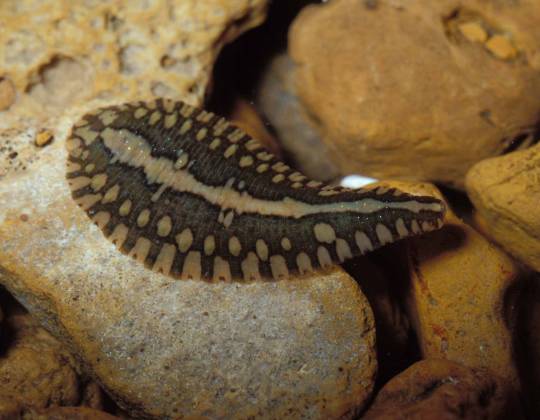
LEECH:
Annelids closely related to earthworms!
A sucker at the head end houses the mouth. On the tail end is a second sucker to help grip surfaces or “walk” like an inchworm.
Usually have a bunch of tiny speck eyes around the head, but some have eyes down the body and on the rear end too!
Most are amphibious to some degree and some live their whole lives on land in moist environments.
Only some species drink blood. Most leeches are predators of snails, worms and aquatic insects.
ALSO good parents! Some leeches leave a cocoon full of babies with its own food supply inside, like a yolk, others carry their young on their underside until they’re big enough to fend for themselves.
Careful and polite vampires. Those that drink blood create only a tiny little pinhole with their bite, using a powerful anticoagulant so blood flows freely from the surgically delicate wound. Once full, they detach and drop off on their own.
MOUTH COMPARISON: (MAY DISTURB SOME PEOPLE???)
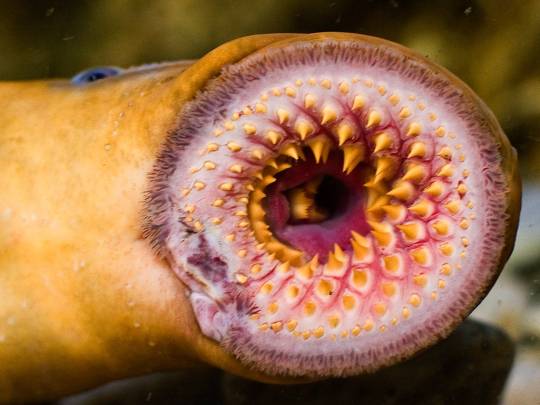
LAMPREYS have the big, gaping circular mouth full of frightening looking teeth, borrowed by countless pop-culture monsters and, incorrectly, most pop-culture leeches.
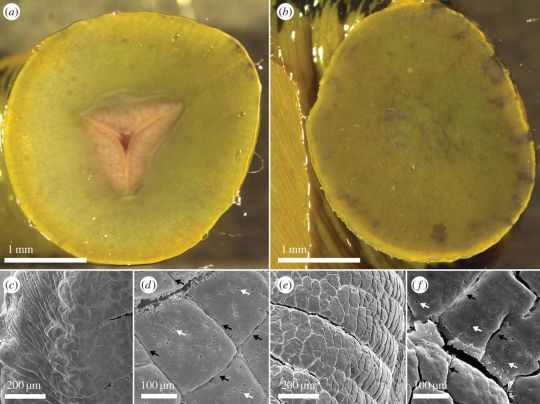
“JAWED LEECHES,” which include most of those that will suck your blood, have a mouth so tiny it’s often not even visible, but it is surrounded with three very tiny jaws in a triangular arrangement, each covered in microscopic teeth.
There does however also exist a large group of “proboscis leeches,” which drill into the host with a needle-thin, barbed “tongue.” Very few of these feed on mammals like us! Yet another group of leeches are both jawless and tongueless; they actually swallow whole prey like a snake.
2K notes
·
View notes
Note
Ok another question. Can u rank best seal teeths for me ? Very curious !
ohh cool i've never considered this question before!! seal teeth are pretty interesting, it turns out. seals are born with teeth, unlike most mammals, and they usually have 34-38 teeth, depending on the species. here's my ranking of the top five types of seal teeth.
crabeater seal teeth
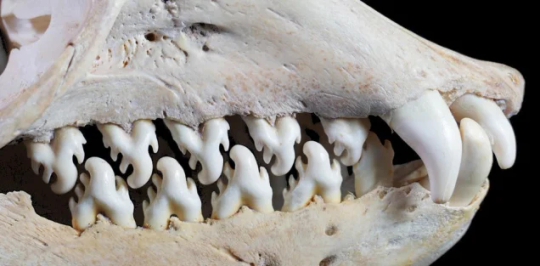
these things have to be number one simply because they're cool as fuck. despite its name, the crabeater seal doesn't actually eat crabs. instead, it uses its specialized teeth to filter krill out of the water, just like whales!
2. elephant seal teeth
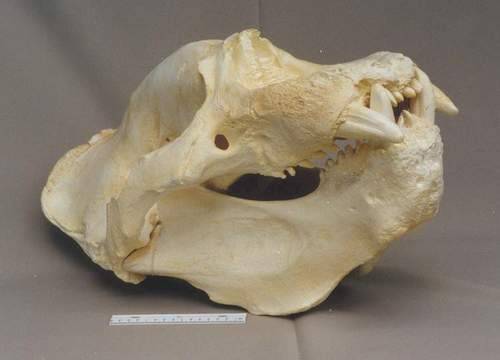
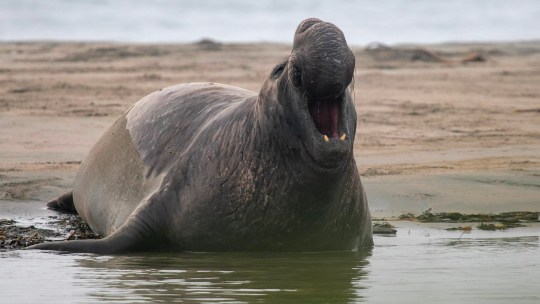
they're nothing fancy like the crabeater seal teeth, but they have to be big and strong since elephant seals use them to fight. plus I think it's so funny how they just look like two little points when an elephant seal opens its mouth.
3. leopard seal teeth
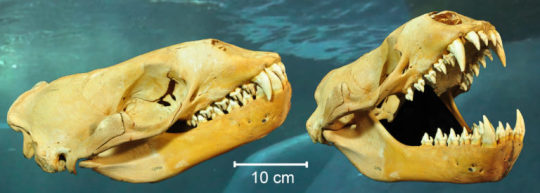
these look a little like crabeater seal teeth, right? leopard seals eat krill too, but also fish, squid, penguins, and even smaller seals! their teeth look very sharp and pointy. leopard seal probably ranks #1 on my list of seals I would least like to be bitten by.
4. harbor seal teeth
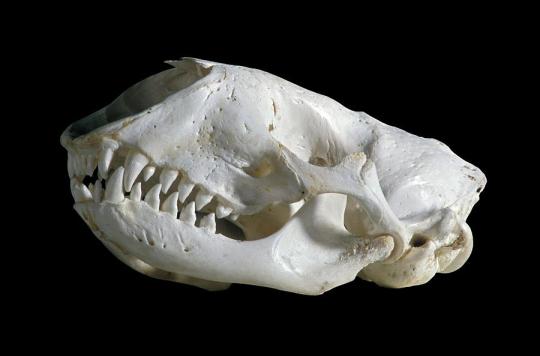
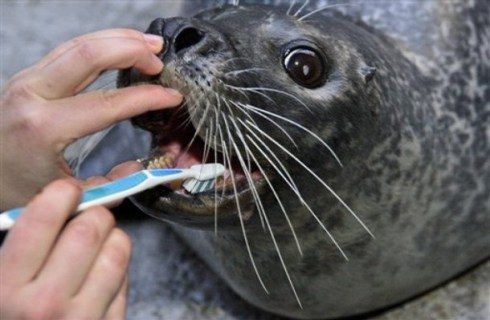
I like how they're so uniform and neat. politely sharp little points. this harbor seal is getting its teeth brushed! harbor seals don't use their teeth for chewing -- they're mostly used to get a good grip on fish, which they will then swallow whole.
5. harp seal teeth
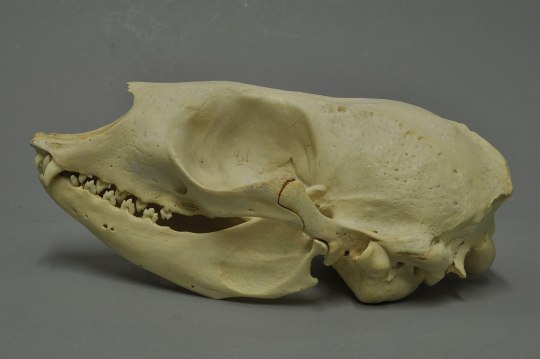
delicate and beautiful. need I say more? the harp seal eats many different fish and ocean invertebrates.
plus: bonus pic of a harbor seal showing off its tongue! seals have bifurcated (forked) tongues. this is because they are beasts of the devil.
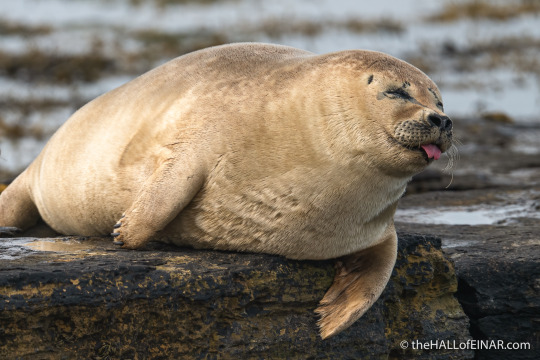
57 notes
·
View notes
Text
Sea Salt Like Glitter: Part One
Summary: You’re a forest ranger. Trees and mammals are your specialty. Mermaids in the ocean? Way outside your area of expertise. Good News: They like you. Bad News: They like you a lot
Mer! Sun x Plus Sized! Reader x Mer! Moon
Part One (Here!), Part Two ,Part Three
Enjoy the first of the wedding month stories! I’m guessing this is going to be around 3-4 parts. I’m a sucker for Sun and Moon and couldn’t leave the Mer AU alone. I hope everyone enjoys!
Warnings: Trapped in Rocks, Blood, Dehydration, Different Species, Threats of Bodily Harm
The best time to go to your beach is around twilight. It’s not technically your beach but your house is the closest one to the water for miles. And technically it’s a ranger station, not a house, but it feels like home after a year of working. You enjoy the calmness of the ocean, gulls screaming and diving overhead. The air smells like salt but you appreciate the burn now. Part of the job is that you have to patrol the waterfront at least once a week and you do that at twilight.
Fredrick Fitzgerald Beach and Forest. One of the most treasured pieces of nature in the country. Nicknamed ‘Pizza Beach’ after the restaurant chain started under the same family, the protected land is looked over by a special kind of warden. A cross between forest ranger, ocean rescue and PR personality, they have the job of living on site full time and making sure people leave the animals alone. And right now, that’s you.
There are other people of course, tour guides and rangers that help at the nature center. You wave at the groups on the hiking trails and listen to the animal facts that you’ve heard 100 times. What you do is different, more secluded. You’re on the other side of the ‘Do Not Cross’ sign and you take your job seriously.
The last few days have been quiet and you’re hoping that the weekend stays that way. Thunderstorms are going to start later in the evening and you’re hoping to be done by then. You had chased some kids off earlier, teenagers looking for ‘a cool place to hang’ and the weather would hopefully deter anyone else from sneaking in.
The water is starting to darken, deep blue going navy. You take a deep breathe, scanning the sand for any trash or people. There isn’t anything as far as the eye can see and you relax, smiling to yourself. Some people think that it’s lonely, being out here for weeks and sometimes months at a time. You enjoy it; you’d rather be with nature than people any day.
You start to hum, watching as the sun finally slips below the horizon. Now your favorite part of the night starts. There are a few moments of darkness before lights begin to flicker under the water. The underwater bioluminescence becomes visible to the naked eye; even after all this time it’s hard to believe that it’s real. The water is much, much deeper than it looks and there’s something in the water that promotes the creatures to glow. Scientists come to study sometimes and you stay out of their way, you’re more of a forest person.
Everything in the water looks normal and you watch the fish dart around, smiling as you stroll part of the beach. You jump as thunder rolls overhead and speed up, calves burning with trying to move quickly through sand. You don’t want to get poured on, walking up the path towards your cabin. The climb is steep and you’re panting by the end of it. The cliffs gives a great view of the water, large rocks creating an outcropping off shore. They jut high out of the water, the largest shaped like an arch. Lazy glowing turns into streaks, fish scattering; must be something bigger under there.
Another clap of thunder bellows and you take off, rain falling in waves. You swear to yourself; your boots had finally just dried out. It’s a struggle to get the cabin door open and you’re glad you know your way around; it’s hard to see anything with the rain and wind. You watch the trees sway for a bit before going to get changed. There’s nothing to do now but wait out the storm.
♥
It’s a couple days before you head back to the beach. Lightening hit one of the larger trees and you’ve spent the last couple days making sure none of the forest caught fire. It’s not ideal but the job can change quickly. After making sure the nature center was alright, you finally head down to the beach. It’s mid-day, much earlier than you would normally go but you’re tired and want to head back early.
The beach is a mess. Seaweed and branches still cover the sand, the waves calm as if nothing had happened. These are some dead smaller fish but nothing too large and you’re thankful for that. Without thinking you begin to clean things up, gathering the sticks closest to you. You half watch a diving gull, seeing it swoop low and then fly off towards the large rock outcrop.
The air leaves your lungs as a gasp, wood falling to the ground at your feet. You can feel your heart starting to pound faster, brain trying to catch up to your eyes. It’s hard to see from the beach but there’s something in the rocks. You curse at yourself for not having your binoculars on you and turn to the stairs, taking a deep breath. It’ll be easier to see up from the cliffs and you’ll be able to tell what it is. Hopefully.
You curse the stairs once you’re at the top, knees aching. You love your job but it’s not made for fat people, even if you’re damn good at it. The sun is hot on your skin and you place your hand over your eyes, squinting at the rocks. It’s a better angle but farther away and you think you see something in the rock arch. It looks like another rock? Or maybe a log? It’s gray and part of you wonders if it’s some kind of ship that’s gotten stuck. The thought quickly leaves as something dark rises out of the water and slams hard against the surface. The gulls scatter with loud screaming and you feel like your eyes are going to pop out of your head.
Some sort of animal is stuck. Maybe a sea lion? A baby whale? Or a dolphin? You go over the possibilities as you rush back to the cabin. There’s a small boat you take out sometimes, mostly to chase fishing boats off. It’s nothing huge but the engine works and it should get you to the rocks.
At least you hope so. Being on the water makes you nervous; you can swim just fine but the boat rocking makes you sick. You don’t think about any of this as you take it to the water, putting it into the back of your truck. There isn’t a direct ride down to the beach but it’s better than nothing.
It takes an hour before you’re in the water heading to the rocks. You made sure to bring as many tools as you could, along with a camera, an emergency phone and gloves. You have no idea what kind of animal that you’re dealing with but if this creature has been stuck since the storm, it’s going to be in rough shape.
The rocks loom high overhead, casting dark shadows on the water. The sun is just starting to sink, even if it’ll take a few more hours. You have a water bottle and resist the urge to drink; you want to see what you’re dealing with first. You turn the boat off about 20 feet away and try to come to terms with what you’re seeing.
The hole in the rocks is about as big as a basketball hoop backboard, the edges not completely smooth but close enough. It’s about two feet above water and something is stuck. Scales so navy they look black are scrapped against the stone, bits of blood smeared as well. It doesn’t move as you get closer, swinging yourself around to get a better look.
You think that you’re looking at its back half. This side of the rocks is shaded by higher formations and it’s a bit difficult to see clearly under the water. Something that you guess must be a tail is slumped into the water but you can’t make out the shape. You grab an oar and paddle closer, letting the waves move you mostly.
Something hits the bottom of the boat and you jump; it was a brush more than anything and of course there are fish out here. The next hit is harder and the boat sways. You place your oar in the water to try to turn and something yanks. You yell as the oar is ripped from your hand and disappears into the water.
A loud rumble fills the air and you watch, horrified and full of awe, as the creature in the rocks moves. The tail rises and you realize that it’s not a tail, it’s webbing. Tentacles shoot out, some grabbing onto the rocks and others into the water. You quickly grab the other oar and move backwards, barely missing the flailing tentacles. Gulls on the rocks take to the sky and the creature begins to shift again.
It doesn’t take long to realize that it’s not doing well, whatever it is. It only struggles for a moment before sagging once more, the tentacles barely holding on. They push against the rocks but it’s weak and the longer you look, the worse it gets. The scales that are out of the water look dull and are starting to crack; it really has been stuck here since the storm.
You know that this isn’t a normal fish. First off, it looks like either a squid or an octopus but both of those would be able to get out of a hole. Also, the hissing and growling coming from the other side of the rock is ominous. You’ve never heard anything like it. You want to head back but you can’t ignore the suffering in front of you. Taking a deep breath, you count to five before paddling to the other side. You ignore the way your hands shake and hope that whatever it is won’t kill you.
Immediately the hissing turns into snarling and you meet blood red eyes. You flinch, holding the oar across your chest like it’ll help you defend yourself. Sharp teeth snap at your and you can feel the waves from the tentacles behind the rock. You’re not in the line of fire and you take a moment to understand what you’re looking at.
A furious face is set on a head coverd in fins, gills fluttering around the neck. The strong torso is covered in navy scales and two arms are digging into the rockface. You look the creature over once and then twice, your eyes always going back up to its face. It looks pissed and like it wants to break you in half. Blood red eyes stare out from a gunmetal gray face and keeps you in it sights.
“Holy shit.” Your voice makes the snarling quiet down, almost like it’s waiting for you to say something. “You’re a mermaid?” You phrase it as a question and the creature, honest to fuck, rolls its mother fucking eyes at you.
At the same time you take it in, the creature looks you over. You’re not much to look at, between your sad little boat and ranger uniform. It eyes you for a little longer between settling back down and looking exhausted. It’s hands, covered in long claws, detangle from the rock and lay against the surface. That’s when you realize it’s pinned.
There’s a log wedged between the rocks, washed up from the storm. The creature is half wrapped around it, the log pushing hard against it’s chest and forcing it’s torso out of the water. One of it’s arms can touch the water but the other is pinned too high up, it’s shoulders pushed far back. It looks painful and you wince in sympathy. You get a snarl for your look, the creature sending you a glare.
It’s eyes close with what you guess is exhaustion, not deeming you a threat. You want to argue but don’t; no need to push your luck. It looks worse from the front, scales dull and patches missing. The rockface has be gauged deeply in the mers struggle to be free.
It’s beautiful. Navy fins on its head and arms lay low, curled up and dull. It’s torso is lighter, the color of sand in moonlight. It’s clearly built for hunting; it might be lean but it’s covered in muscles. Darker scales cover the torso like stars and you know that you can’t leave it here, even if it wants to kill you.
“Hey.” Your voice has the creature opening it’s eyes again but only halfway. It takes you a second to get that they’re squinting at you; the sun must be bothering them. You lick your lips, knowing that it’s crazy to be talking to something this big. “Do you uh, want me to help you?” You wince at how uncertain you sound and the creature looks even more unimpressed than before. You hear something hit the water and assume it’s a tentacle.
You hold up a length of rope and then gesture ot the log. Eyes flicker between rope, your face and log. Some sort of spark comes into its face and it’s claws curl into the rocks slowly. You put the rope down and grab the oar, slowly moving closer.
It’s hard to get a good judge of size because of how it’s stuck but you guess that it’s at least eight feet long, maybe closer to nine. It doesn’t move as you get closer, eyes locked on you. The log is wedged in two places, one part under the water and the other above. When you look down, the bottom half seems to be covered in rocks, probably from the struggling. The only real option is to loop the rope of the top and yank.
“I’m going to go for the top.” You talk and gesture as you move closer, trying to be transparent in your movements. “The bottom half looks too stuck.” You would be concerned by the lack of response if it wasn’t for the red pinned on your face. It takes a little bit to get the boat maneuvered just right and the scrapping of its claws gets louder. You do your best to ignore the impatience; you don’t want to end up in the water today. Not now that you know things like this exist.
There’s a splash in the other direction and you flinch hard, almost falling from where you’re standing. The creature snarls, sharp teeth flashing in the sun and you look over the water. Nothing breaches the surface again and you shake your arms, trying to get rid of the tension. As long as there isn’t another predator you should be alright.
You have to throw the rope a few times before it’s looped just right and you can feel the waves of judgment coming out of the mermaid. Mer creature? You’re not stupid enough to pretend this isn’t some sort of intelligent creature; you’ve been pinching yourself too much for it to be a dream. That doesn’t mean that you want it commenting on your physical abilities and ignore how embarrassed you’re getting. Finally, you get the rope secured and you tug it to make sure. You can sense the growing impatience behind you and vow silently to go faster. It’s already in rough shape and you don’t want it to suffer.
Sending one last silent plea inside your mind, you start the boat engine back up. The creature flinches inside the rock and the gentle rumblings turn more into a hiss. You glance over and it flashes it’s teeth with a ‘get on with it’ feeling. You don’t hesitate, afraid that you’re going to lose your nerve. You throw the engine into reserve and gun it back, the boat taking off as fast as it can.
The rope is pulled taught quickly and you jerk, almost going into the water. Creaky rumbles come from the creature and you want to swear when you realize it’s laughing at you. You ease the boat back forward before going in reverse again, your eyes locked on the log. The first time it didn’t move but the second it seemed to slip. Gritting your teeth you repeat the actions, the log slowly becoming free.
The creature must feel it moving because it begins to push, well as much as it can with it’s chest. It looks painful with the open wounds but it doesn’t care, eyes getting brighter as the log shifts. You give it one last tug and the log comes free, the creature letting out an ear-piercing shriek.
A few things happen at once. Your boat, tugging with all it’s might, flies back once the resistance is gone and you scramble to not turn over. The creature slides backwards into the hole, sliding into the shadow covered water. Lastly, bright red fins crest the water in front of you, darting behind the rock.
Your boat spins for an embarrassingly long time; your arms ache and it takes everything in you to prevent it from flipping. The bottom of the boat has a good couple inches of water but you’re upright. A miracle. The clicking and hissing sounds are all gone now and it’s just you and the gulls. You watch the water once your heart calms down, eyes darting around to see if you can spot the creature in the water.
You wait for ten minutes before slapping your cheeks and turning the boat back towards shore. Your mission was officially done and you need to lay down, maybe have a drink, maybe get high. There was a lot you have to think about and you don’t want to do it in the open water. Two pairs of eyes, one red and one blue, watch as you make your way back to shore and share a silent look. The water barely ripples as they sink below the waves, determined to pay you back in some way.
#fnaf#sun imagine#moon imagine#fnaf daycare attendant#sun x reader#sun x reader x moon#moon x reader#daycare attendant x reader#daycare attendant#mermaid au#mer sun#mer moon#fnaf security breach
179 notes
·
View notes
Note
I would love a chunk-funk-gunk rating of any seal of your choice!
Today on CHUNK! FUNK! GUNK! We rate
the HARBOR SEAL:

10/10 Chunk
4/10 Funk
0/10 Gunk
HARBOR SEALS!! My personal favorites, since one of my favorite stuffed animals when I was little was a harbor seal bought from a gift shop at a harbor. Seals are very funky animals in general, but if I rate them on a scale of ‘general funkiness’ or ‘funkiness for a SEAL’, then the values are different. Harbor seals aren’t the most unique or interesting seals, but they are cute and spotted. Chunk is self explanatory. Look at them. High chunk. Very dry little guys, no gunk.
#chunk funk gunk#chunk#funk#gunk#harbor seal#seal#ocean mammals#marine mammals#rotund#I love seals they’re all so cute#I’m the kind of person who sees a seal pop its head up out of the water and starting squealing and clapping#asks open#ocean#ocean animals#I think this is our first mammal that has been rated
180 notes
·
View notes
Text
Have You No Idea That You’re In Deep? [Chapter 2: The Same Agony]

Aemond is a fearless, enigmatic prince and the most renowned dragonrider of the Greens. You are a (newly widowed) daughter of House Mormont and a lady-in-waiting to Princess Helaena. You can’t ignore each other, even though you probably should. In fact, you might have found a love worth killing for.
A/N: Thank you all so much for the love this series has received! I hope you continue to enjoy it. 🥰🥰
Song inspiration: “Do I Wanna Know?” by Arctic Monkeys.
Chapter warnings: Language, slightly more extensive witchcraft, mentions of death and violence, sexual content, this fic is for readers 18+!!!
Word count: 4.8k.
Link to chapter list (and all my writing): HERE.
Taglist: @crispmarshmallow @tclegane @daddysfavoritesexkitten @poohxlove @imagine-all-the-imagines @nsainmoonchild @skythighs @bratfleck @thesadvampire @yor72 @xcharlottemikaelsonx @loverandqueenofdragons @omgsuperstarg @endless-ineffabilities @devynsshitposts @vencuyot @ladylannisterxo @itzwhatever123 @cranberryjulce @abcdefghi-lmnopqrstuvwxyz @liathelioness @mirandastuckinthe80s @haezen @fairaardirascenarios @darkened-writer @weepingfashionwritingplaid @signyvenetia
Please let me know if you’d like to be added to the taglist! 💜
“You wouldn’t happen to have any bear teeth, would you?”
“Bear…teeth?” Aemond blinks at you, confounded. You are standing together in the doorway of Helaena’s chambers as she plays on the floor with the children: stacking wooden blocks into diminutive castles, demolishing them with cloth dragons, chanting childhood nonsense songs in a wavering, whisper-soft voice. It is late-morning, and sunlight pours in through the open windows in sheets like rain.
“You see, bears are large terrestrial mammals. Their pelts make good rugs. They are commonly found in caves and forests, eat lots of salmon, and have often been observed—”
“Kindly desist your taunting,” the prince says, though fondly. “Why on earth would you require bear teeth?”
You hesitate. “They’re for…a tradition.”
“A tradition?”
“Um…perhaps…rather…a ritual.”
He flashes a devious grin. “A ritual, or a spell?”
You sigh in defeat. “Never mind. Forget I asked.”
“You still worship the Old Gods,” he realizes. His single remaining eye—bright, cunning, oceanic blue—sweeps you up and down. He is not mocking, not appalled; he is forever seeking to uncover more pieces of you like shells collected from sand. “Well…that’s alright. We won’t tell Mother.”
“Yes, please don’t. She’d send me to the Wall.” This is an exaggeration, though not by much.
“What sort of spell involves bear teeth?” Aemond inquires, amused, like he’s waiting for a punchline.
“One for protection.”
“Oh? And who do you believe needs protecting?”
You peer up at him guiltily. He’ll hate that you’ve had this thought. “You’re riding in the tourney tomorrow.”
“Me?!” he exclaims, and laughs. It’s an alarmingly beautiful sound; you have to stop yourself from reaching out to touch him, his face or his forearm or his long silvery hair. “You think I need protection?”
“You never joust. You haven’t in years, I know, people won’t stop talking about it. They’re all baffled by your sudden interest. Everyone’s wagering bets. And you’re out of practice.”
“Hm, yes, well if Axel Hightower can do it then surely I’ll manage.”
You’re dismayed; if you’ve unwittingly encouraged him, that makes you responsible for any resulting catastrophes. In your own heart, at least. “Please tell me you aren’t doing this to outshine my dead husband.”
“Logistically, it would be rather difficult to compete with a corpse.”
“You don’t joust,” you say. “You never joust…”
“You know, my Uncle Daemon was known to joust on occasion.”
“Perhaps, but you aren’t.”
“Calm yourself.” He’s impatient now. “It’s a tourney, not an execution. And my match is some Lannister boy, it’s not like I’m stepping into the tiltyard with Ivar Kellington.”
“Right.” Ivar is the son of a house sworn to the Baratheons, and he is positively monstrous: tall, broad, fearsome, immovable. When he spars, he has to face two or three ordinary men to keep it competitive. He’s responsible for no less than four deaths resulting from tourney mishaps. He has a reputation even larger than he is; you’d heard about him all the way back in the Reach during your marriage. People around the court refer to him—with both awe and shudders—as ‘Sir Killington.’
Aemond considers you, always searching, never quite finding his footing. “I thought you weren’t one to shy away from battles.” And then he adds swiftly, just to emphasize how beneath him this is: “Not that a tourney is anything like a real battle, of course.”
“I’m not trying to stop you. I’m just trying to help.”
“I don’t need your help,” he replies briskly.
“Fine.”
He stares out into the hallway with his arms crossed. You stare over at Helaena and the children without really seeing them. Neither of you speak, but neither of you leave either.
“Enjoy your sparring,” you say eventually.
“Enjoy the beach,” Aemond replies, and departs almost soundlessly like a shadow. You tug on your pendant as you watch him disappear down the hallway: the lines of his shoulders, the sheen of his hair, the way strips of sunlight fall on him through windows and doorways. As your grip tightens, the oval of moonstone etches its shape into your palm; the silver chain digs into the soft vulnerable flesh at the back of your neck.
That did not go well. That did not go well at all. You frown absently, your mind elsewhere. So much for my attempted witchcraft.
“Lady Mormont?” Helaena beckons, breaking your apprehension like glass. She clutches one of Jaehaera’s tiny hands in hers while Jaehaerys stomps around demolishing microscale castles. You hope this is not prophetic of his (possible, far-off) future reign. “Help me get the children ready. The sea is calling for you.”
You shimmy the toddlers into swimming clothes, gather up toys and linens and pieces of fruit, and walk with Helaena and her white-haired twins down to the golden sand, to the water’s edge. As Helaena supervises her children—which consists primarily of having flustered handmaidens chase them around while the princess sits on a sand dune and embroiders a green-thread praying mantis onto a pillowcase—you wander ankle-deep in the warm, foreign surf.
King’s Landing is nothing like Bear Island. Home was stormy and grey and fog-cloaked, harsh, cold, rocky, inescapably brutal. Home felt old, hopelessly old, older than the stars; there was no hope of changing one’s life there. The people of Bear Island have been scraping out an existence—forcing an untamed, unwilling land to nurse them at blade-point—since long before the Targaryens ever set foot in Westeros, since before the Andals, since before there was any divide between history and myths. But here…here…
As you stand on the beach below the Red Keep, there are gulls circling far overhead and clear blue skies and invigorating heat and ships gliding ceaselessly in and out of port. This land yields life plentifully, effortlessly. Within the walls of the city there are people clawing their way up ladders every minute of every day, and tumbling down them as well; there are always new futures to be made. This is an idea you could get used to. This is a world you could get used to.
Later, much later—after bathing the children, after lunch, after visiting the sept with Queen Alicent (requiring some pantomimed piousness on your part), after a meandering stroll through the godswood, after music and dinner and dancing—he finally returns. You don’t need to see him come in. You can hear his footsteps; you can feel the room shift like a ship rocked by waves.
“Aemond!” Helaena squeals in glee and rushes over to him. Meanwhile, you loiter by the fireplace pretending to be engrossed in a letter. In truth, you’ve read it twice already, and it wasn’t all that enthralling to begin with; one of your cousins, married into House Manderly, has just birthed her fifth child in seven years and feels the compulsion to tell the whole world about it. It occurs to you that some people’s luck is really quite excessive.
You try not to listen as Aemond asks Helaena about her day, as she prattles on about the beach (but mostly about her insect embroidery), as she gets sidetracked and scurries off and lowers herself onto the couch to finish the aforementioned embroidery. The prince’s familiar footsteps approach you. You refuse to look up until he’s waited several minutes with nothing but the dry, popping fractures of wood in the fireplace to split the silence.
“Did you and Sir Criston have a productive time hitting each other with sticks?”
“There was a slight change of plans.”
He tosses a leather pouch to you. You catch it in mid-air. Inside are cracked, bloodied bear teeth. You gasp in the flame-lit stillness. “How…?”
“It was the strangest thing. I, entirely unprompted, was struck by this intense desire to go bear hunting.” He grins: impish, off-kilter, waiting to see if you’ll forgive him. “I hope they’re adequate, they were difficult to…uh…dislodge. From the skull, I mean. And I wasn’t sure if you wanted them…you know. Cleaned.”
“No, you did well. It’s better if they’re bloody.” You are struck by a sudden, ludicrous vision of the prince practically dragging Sir Criston Cole through the woods for hours—their boots coated with mud, their brows sweated, twigs embedded in their hair—while dodging Sir Criston’s increasingly exasperated inquiries. “I don’t know why you did this for me.”
“I know what it’s like to hold something sacred that others don’t understand.”
From the couch, Helaena murmurs: “He had to close his eye.”
You turn to Aemond for a translation.
“To get my dragon,” he says softly, then gestures to his lost eye: quickly, as if he doesn’t want to draw any more attention to it than he absolutely must. You know it happened in some sort of childhood scuffle between Alicent and Rhaenyra’s sons—every noble who’s ever travelled south of the Neck knows that—but you’ve never heard the details. Unthinkingly, reflexively, you reach out for him, resting your right palm against the mutilated half of his face. He’s so perfect in spite of the destruction his flesh holds like a memory; he’s so fucking beautiful. Your thumb ghosts across the section of scar that slits his cheek in two. Aemond flinches and catches your wrist.
“I’m sorry,” you whisper.
Gently, he lowers your hand back to your side. Then he grasps your pendant to examine it more closely. “Hm. Moonstone and silver, together, entwined. Curious, don’t you think?”
“Very,” you agree. You wonder what he looks like without his eyepatch, not in a morbidly curious sort of way but out of a longing—a craving—to know every part of him entirely.
“I’ve studied the Old Gods, you know,” he says. “Purely for scholarly purposes. And the Drowned God, and the Lord of Light. There are temples dedicated to Him in Dorne. I’ve exchanged letters with several of the maesters there.”
“I’m sure your mother is positively delighted that you’re writing to maesters instead of eligible Baratheon and Lannister women.”
He smiles wryly. “Aegon has brothels. I have the library.”
“So you don’t spend all your time sulking around unnerving courtiers.”
“Well, not all of it.” His face is illuminated by the fire, amber and scarlet and gold. He reads the nervousness on yours: the tourney, the joust, your own dawning realization of how much he means to you. “Fear not. I’m coming back.”
“That’s exactly what my mother said before she left me in the Reach with Axel Hightower. And I never saw her again.”
Without speaking, Aemond cups your face in his hands. He touches his forehead to yours—lightly, lightning-briefly—and then backs away. He takes several long strides, as if he’s afraid of what will happen if the space between you could be so easily closed.
“Good luck tomorrow, Silver,” you tell him.
He glances down at the leather pouch of bear teeth still clutched in your left hand. “I thought you were taking care of that for me.”
~~~~~~~~~~
When the rest of the Red Keep is slumbering in unwitting darkness, you slip unnoticed back to the heart tree. You have to do this part here, where the Old Gods can hear you; you have to give Aemond the best chance you can. You pour a handful of the bloodied teeth, rosemary, sage, sea salt, and your last few pebbles of black jade into the mortar you left Bear Island with, and then Oldtown after Axel’s death. You hope you never have to leave King’s Landing. Everything in you struggles against the thought of it, like an animal with its paw in an iron-jawed trap. You light a white candle and set it on a root of the heart tree.
“Protect him,” you implore the flame again and again. It flickers and bends to you in the cold night wind. You grind the teeth until they are a fine, pale-pink dust. “Break others if you must, burn others if you must, bury others if you must…but protect him.”
This next part is the trickiest. Back inside the Red Keep, you evade guards and handmaidens to slink inside the prince’s chambers. The man you are regrettably falling in love with—Aemond Targaryen, Aemond One-Eye, the dragonrider of Vhagar—is exactly where he should be: asleep in bed. He is sprawled on his stomach and occasionally murmuring as if in the middle of a very consequential conversation. He is mostly obscured by blankets, but you can see he’s not wearing his eyepatch; his white hair flows freely and unincumbered over the pillows. You are careful not to look too closely at him, only because you know he wouldn’t want you to.
You crouch down on the cold, hard floor and scatter the powder you’ve ground under his bed. No one would ever recognize it as witchcraft. It could be sand, it could be dust, it could never be noticed at all. When you are finished, you flee the room with feather-light steps.
Yet you think you might have heard it as you crossed through the doorway, just maybe, just barely: a creak, a stirring, the prince rising to catch a glimpse of you with his sleep-bleary eye.
~~~~~~~~~~
A Mullendore unseats a Buckwell. A Tyrell unseats a Rollingford. A Westerling gets so drunk he falls off his horse mid-charge and the Tully proclaims victory. Sir Ivar Kellington breaks some poor Massey boy’s jaw. Everyone applauds politely.
Aegon leaps to his feet. “Well done, Sir Killington!” he shouts, raising his wine cup. “Uh…I mean…Kellington.” Aegon drops back into his seat. Otto Hightower glares at him.
You tug nervously on your moonstone pendant. Helaena claps and smiles when necessary but otherwise watches the birds, the clouds, the horses and works on the favor she’s making. The queen is wringing her hands and dressed—predictably—in a rich emerald-green gown. Alicent has always struck you as kind and affectionate enough, albeit in a distracted sort of way. You suppose she has plenty of legitimate distractions. Her husband the king is ailing, rarely seen, unlikely to live much longer. Her father is ruling the kingdom in all but name. Her estranged stepdaughter, a prospective schemer and confirmed dragonrider, is the heir apparent. And she has an adult son in need of a politically-expedient marriage…a son who doesn’t have any spare eyes to sacrifice to this tourney.
You turn to Aegon, who stares vacantly down into the tiltyard with red, groggy eyes. “I know the prince is good on his feet, but can he joust? You know…without his…?” You point to your own unharmed eye in explanation. Aegon shrugs listlessly. This does not inspire confidence.
As Ivar Kellington exits the tiltyard, Aemond comes in. They exchange a look as they pass each other on their horses, a silent antagonism, a taking of measurements. It can safely be assumed that Ivar—a man whose legacy will be built on the bones of the people he’s brutalized—would like few things more than a chance to publicly skewer the prince, but he won’t get it. The Hightowers would never allow such a match. Aemond smirks up at the giant triumphantly.
The crowd cheers as Aemond and the Lannister boy he’s scheduled to joust gallop around the tiltyard, but in a way that is tentative, taunt, uneasy. No one can recall ever seeing the brooding, one-eyed prince participate in a tourney before. As his long white hair flows out behind him like a banner, as he sizes up his opponent with a cool, stoic gaze, people chatter about how much he reminds them of Daemon Targaryen. Is Aemond another rogue prince? Is that primal breed of fear that he inspires in people deserved? You observe the nobles gathered here from your seat between Aegon and Helaena, noting for the first time just how many seven-pointed stars there are: on cups, on chairs, on pieces of embroidery, on necklaces. Queen Alicent wears them constantly.
What do they do to witches here? Burn them?
A bolt of dread pierces through your chest like a blade. No one is looking at you, of course; no one is paying any attention to you at all. But suddenly you feel naked in this crowd.
Sir Criston has appeared to give Aemond his parting words. He grabs the horse’s reigns and says something to Aemond that you can’t hear over the thunderous noise of the audience. The prince nods. Criston speaks again, miming a technique. The prince continues to nod. His mood is evident from his posture: Yes, okay, alright, let’s get on with it. Criston hands the prince his helmet, which is open in the front and without a visor, and people murmur about how Daemon always wore the same style. You think it has less to do with an homage as it does with practicality. Aemond cannot afford what sight he has left to be obscured by metal. He doesn’t look at or acknowledge you in any way, but when he dons his helmet and his hair is momentarily displaced you see it rubbed onto the back of his neck where no one will notice: a fine, chalky, pinkish dust.
He saw me after all. In his bedroom.
You can envision him crawling out of bed and dropping to his knees, investigating while still clumsy and half-asleep, pressing his palm to the dust before marking himself with it. You smile, a solitary moment in a pulsing space.
That has to be good luck, doesn’t it? That has to give the spell more power.
You wish you knew more about magic. You wish your mother was still alive.
Sir Criston hands Aemond his shield and his lance. Aemond asks Helaena for her favor. She gives it to him wholeheartedly: a small wreath of green calla lilies she’s been weaving together with jittery fingers. She waves him off and then sinks back into her seat, silent and remote.
Aemond takes his place at one end of the tiltyard. The Lannister boy—Leland or Luca or Landon or Lyndon or something like that, you keep forgetting—waits on the other. Their horses paw at the earth restlessly. There’s already blood in the soil, the air. Everyone else clears the tiltyard. The seconds tick down.
Suddenly—like falling forward—both riders have kicked their mounts and the horses are hurtling towards each other. The space between them evaporates like a waning moon. People are screaming all around you, and some of the noise is pure exhilaration but a good amount of it is horror, because already people can see it: the prince’s lance is aimed just a bit too low and too far to the left, and the Lannister boy’s lance is poised to collide with Aemond’s unguarded face. Aemond sees it too, soon enough to know but not soon enough to fix it. His blue eye is wide and gleaming with doomed shock.
Before the riders can strike, there is a deafening snap, a cracking of bones. The Lannister boy’s horse plummets to the earth as its left fetlock shatters. The Lannister boy’s lance goes flying, his lips loose a shriek…and his body falls perfectly into the line of Aemond’s lance. The prince’s lance crashes into the Lannister shield and sends the boy soaring off the back of his collapsing horse. The crowd explodes into cheers and applauds. Aemond has won.
He is dutiful about it, honorable about it. He dismounts and helps the Lannister boy to his feet and expresses sympathy about the horse: such bad luck, so unfortunate, although everyone knows horses are prone to such accidents. He bows graciously to the crowd of courtiers who have so consistently ignored, avoided, misunderstood him. And only then does he come to accept congratulations from his family.
Aemond receives a giddy hug from Helaena, a sloppy whack on the shoulder from a very intoxicated Aegon, and kisses on his hands from the queen. Otto Hightower gives him a proud, beaming nod. Sir Criston sprints up from the tiltyard to embrace—in fact, nearly tackle—the prince. In the joyous mayhem, you make no attempt to capture Aemond’s attention, but he does fight his way through it to find you. He circles an arm around your waist to pull you close so he can whisper to you as he places Helaena’s calla lily wreath on your head like a crown.
“I’m awfully glad I found you those bear teeth, Moonstone,” he says, and then he’s spirited away by admiring nobles.
You watch—alone in the havoc—as Aemond is commended by the great families of Westeros, the fathers and the matriarchs and the marriageable daughters too; and you are struck by a sudden and overwhelming sadness.
He is going to marry a Baratheon or a Lannister or an Arryn or a Stark, you think. And any fantasy that deviates from that eventuality is pure, self-inflicted cruelty.
You don’t belong in his world. Perhaps you don’t really belong anywhere.
Unnoticed—or so you believe—you escape through the spectators and into a small, empty stairwell of the Red Keep. You crumple onto a step, entertain the possibility of composing yourself, and then rupture into helpless, pitiful tears. You sit there sobbing with your face in your hands for five minutes, or ten, or twenty, you aren’t sure. It doesn’t matter. No one misses you.
When you hear the footsteps, you immediately know who it is. You don’t even look up. You wipe your sore, drenched cheeks with the sleeves of your gown and stare down at the stone floor in abject humiliation.
“What troubles you?” he asks. You marvel at his voice, and not for the first time: calm yet compelling, soft-spoken and yet so heavy with gravity.
You consider lying to him, but you don’t. The answer is so simple. Now your eyes find his. “I want something I can’t have.”
Aemond nods, solemn, pensive. “I find myself afflicted with the same agony,” he says. And then he’s gone.
~~~~~~~~~~
There is an informal feast held in the Great Hall to celebrate the winners of the tourney. People roam and mingle and eat off of plates balanced precariously in one hand. There is dancing and music, an anxious plucky sort of sound that plays from the strings. Aemond is the guest of honor, although no stranger would guess it; after his short obligatory exchanges with various nobles and fellow jousters, he makes his way back to his immediate family. You are obliged to accompany Helaena, and thus bound to stay near Aemond; all night you orbit each other like planets, like seasons. Sometimes he catches you watching him as you sip your wine, sometimes he skates his palm along the small of your back as he passes behind you, over and over again you find excuses to stand next to each other while saying nothing, while thinking everything, while feeling each other’s heat through the infinitesimal space between you. Finally, as the evening careens towards midnight, he finds you alone in the doorway of the same winding staircase he tracked you to earlier, except now you’re at the top of it. You’re nursing a cup of wine, unnoticed and unnecessary, still wearing the crown of green calla lilies. Helaena is thoroughly preoccupied with a plateful of pear tarts and the doting attention of Otto Hightower. Aegon is presumably off badgering a servant girl somewhere…or perhaps passed out under a tree.
“This is an odd question, I freely admit it,” the prince says, close enough that you can see the ring of dark blue around the edge of his iris like the ocean at night. Torchlight glows on the flush in his cheeks: one pristine, one ruined. “But would you happen to have been in my bedroom last night?”
“I have no idea what you’re talking about.”
“Lying is a sin in any religion.”
“Alright, yes, I was there. Briefly. Very briefly.”
“So you didn’t want to stay?”
In reply, you only gaze up at him, wanting him so badly it puts aches in your hands, your spine, your lungs, the threads of your heart. His smile is knowing and playful and warm and kind. He reads you the same way he pours over dusty, long-forgotten books in the library and you read him like a spell. You want to know everything he’s made of. You want to feel him beneath the innate design of your fingerprints. He looks into your eyes and sees all of this and more; and then he turns and descends the stairs.
You follow after him, your dress dragging on the stone steps. His footsteps are so light they’re nearly soundless. He moves like a storm, like a wolf; you don’t hear them until they’ve got their jaws around you. Torches burn overhead as you traverse the staircase down, down, down. You can still hear the muffled music of the strings through the castle walls. You can feel the pounding of your heart, the blood roaring in your ears like waves. The music fades as you walk, and then disappears; but your heart grows louder.
When you reach the final step, Aemond catches you, presses you against the wall, kisses you so deeply it feels like you’re drowning in him: in heat, in insatiability, in all that long-caged wildness screaming to be freed. Your wine cup and crown of calla lilies both tumble to the floor. His hands are gliding beneath your dress. You’re ripping open his tunic. In the sea of fabric, his fingers find the velvet-soft inside of your thigh and follow it upwards. You’re soaked for him already. He moans, licks his fingers, kisses you so you can taste yourself on his lips, his tongue. Your hands tangle in his hair and drag him closer, closer, until there’s no space left between you, not even enough to second-guess this. You open your thighs wider, bite his neck, beg him to fuck you. His fingers stroke you until your hips are thrusting in rhythm, until you’re stifling your cries against his bare, flare-hot skin. There is a powerful, shuddering sensation of an opening, a warm glowing like liquid gold. Reflections of fire dance over you both. His breathing is ragged, ravenous. Even through his clothes, you can feel how hard he is, how thick. You are starving to be filled with him.
“Wait,” you gasp, and immediately he stills. You touch his face, your palm to his scar, and this time he doesn’t flinch away. “Can I see you?” you say. “I want all of you. The real you.”
He hesitates. He reaches for his eyepatch. He rips it away in one fluid motion, like a bandage off a fresh wound, like he’s afraid of losing his nerve. Where his left eye should be is jagged flesh framing a glittering, savage-blue sapphire. You can see the shadow of the little boy he was when he was disfigured and never avenged. You can see every brick he’s built himself with since.
“You’re so fucking beautiful,” you whisper, your words weightless and vanishing like smoke.
“I never wanted people to pity me.”
“No one pities you. They fear you.”
Aemond asks, mesmerized, spellbound: “Why don’t you fear me?”
“Because I was raised to admire ferocity, not to run from it.”
“You are perfection,” he breathes. “You were made for me.”
You grab his face with one hand, hook it around his jaw, and look him straight in his eyes, both of them: one flesh, one sapphire. “Show me.”
You’re still throbbing, still slick, still roiling in aftershocks as he plunges inside you. You fuck with your faces close and your hands entwined, kissing, moaning, biting, whispering promises that cannot be kept. When he comes, his teeth close around your collarbone to keep himself from crying out; and then he rests his forehead against yours. You remain there together in this dying moment, in the receding seconds, dwelling in them like the last days of summer. Then he steps back and the illusion is shattered.
You let the hem of your dress drop to the floor. Aemond refastens his tunic and smooths his hair. As you find your balance on weak and trembling legs—as you adjust to the unwelcome absence of him—you push Aemond away. “Go,” you say, glancing to the steps. “Go. I know you have to.”
His hands are open, empty. “Are you sure—?”
“Go,” you insist. “Please, just go. Before you’re missed.”
He looks at you like he’s going to say more. Then he picks up his eyepatch off the floor, secures it over what remains of his left eye, and ascends the staircase to rejoin his family in the Great Hall. That’s where he belongs, after all. That’s where he will always belong.
You wait to follow him until enough time has elapsed to evade suspicion. You wait at the bottom of the staircase in silence, in agony, your skin crawling with the echoes of flames.
802 notes
·
View notes
Text
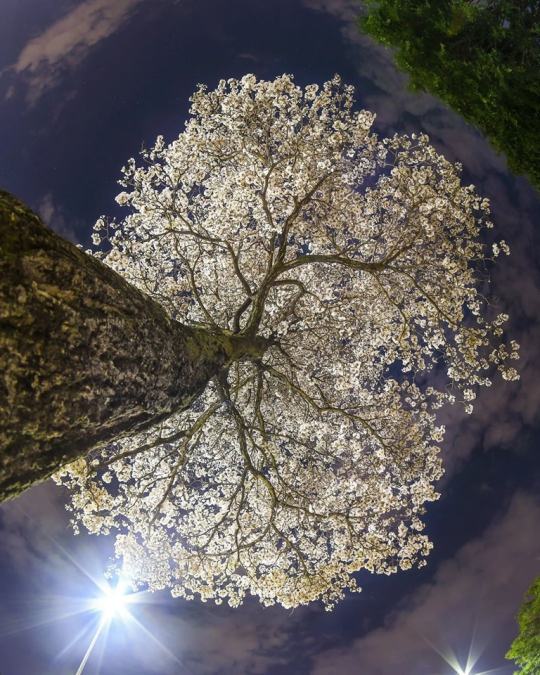
I appear in sea, in wind, in soil, in starlight. In the sun I appear. I appear in mountains and desert rain. I am the star and I am the stone. I am bird and fish, sky and sea. One and whole eternally, I come, differentiating, multiplying, refracting like a ray of light through ten thou-sand water-droplet prism pearls suspended in earth's highest sphere. Shining I come, to touch the surface of this matter world in a splashing, multicolored chorus of light men and light women, created to bring beauty, love, order and grace to this sacred dance of atomic form. Stardust. Frozen starlight. You call it matter. It is an art form with which we have worked for twenty billion years. We have sculpted it into star systems, galaxies and a universe of rainbow-spectrum worlds. We are the children of light. We have been given the task of creating dimensional reality. We draw order, structure and beauty out of the vibrating music of starlight.
From the redwood forests to the microbes, from the gentlest feathered bird to the most substantial ocean whale, our spirits manifest the Creator's designs in all the biological life on this planet. Yet only human circuitry has the capacity to embody the full reality of who we are, of who that Creator is—of who, in truth, you are. Come, human children, the truth has always been here. Your prophets have ever made it plain. Wherever you have let us land, wherever you have let our consciousness settle upon the waters of your awareness, the open waters of your human hearts, ever w e have come to inhabit your shores. We are the superior intelligence that you are looking for in the galaxies. We have been in your parks, in your treetops, in your gardens, in cages in your livingrooms. We are the Bird Tribes. And we are returning. We are here to teach you how to fly. Take us out of your cages of concept and archaic definition. Come, join us in the living treetops, where the winds of spirit blow wild and free. We are the Bird Tribes. And we love the flowing, fluid, gentle waters of our Mother's eternal truths, as we love the stars that nourish and support these biological robes of dancing light. We will never be far from water or land, from light or sound, from the Father's fire or the Mother's gentle wisdom. For we are the Bird Tribes, entering this earth to swim beneath her waters as fishes of the sea, to walk on her land as the mammals and the humans of this age and to fly through her heavens on the wings of the Love that created us and creates us anew in each moment. Because we love these oceans. We love these lands.
We love this planet with an eternal fire that takes all the myriad stars to reveal in the fullness of time, but only one star to say to one world, “I love you this much, that I would give you all that I am; my fire, even to your ages of ice; all that I am, until we grow the children, until we conceive the offspring who will be equally a child of starlight's fiery love and an ocean world's gentle truth.” Awaken, humankind. The teachers of love circle round the morning star. Spiraling down. Coming to rest. They land. At the edge of your history's shore. Fluttering into consciousness. The Bird Tribes return.
--Return of the Bird Tribes : Ken Carey
71 notes
·
View notes
Text
Meet MBARI: Autonomous robots help team reveal the secret lives of ocean predators
youtube
At MBARI, our “office” is Monterey Bay and its deep submarine canyon. For many of our staff, that means spending much of their time on the water. Our marine operations team tests, deploys, and maintains a variety of underwater robots and instruments. Jared Figurski is a senior ocean observatory engineer, leading a team of scientists and engineers who are using autonomous robots to observe ocean predators.
Tunas, sharks, seabirds, and marine mammals play an important role in ocean ecosystems, but these top predators are also challenging to study. They spend much of their time far out at sea, dispersed across the open ocean. Many are also fast swimmers that can easily evade a boat or robot. MBARI’s Piscivore camera system gives us a glimpse into the secret lives of these ocean predators.
Piscivore’s video observations help us better understand populations of ocean predators and their prey. The data collected by Piscivore and MBARI’s ocean observing platforms can help resource managers implement regulations to protect marine life and ecosystems from threats like overfishing and climate change.
MBARI’s innovative technology is transforming what we know about the ocean and its inhabitants. Our scientists, engineers, and marine operations staff work together to create innovative tools for a more sustainable future where autonomous robots and artificial intelligence can track ocean health in real time and help us visualize ocean animals and environments. Studying our blue backyard is revealing our connection to the ocean—how it sustains us and how our actions on land may threaten its future.
We’re spotlighting various teams at MBARI to showcase the different ways we’re studying the largest environment on Earth. We hope this series inspires a new generation of ocean explorers. Dive in: https://mbari.co/MeetMBARI

61 notes
·
View notes